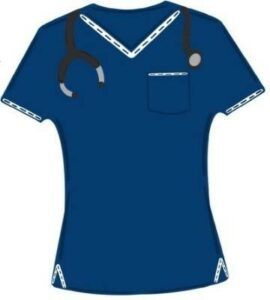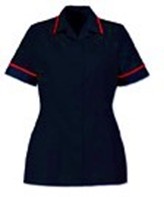Meet the Maternity Team
Please note, this page is printable by selecting the normal print options on your computer.
Welcome to the maternity department
Whilst you are in the maternity department, you may see many different members of staff. If you’re not sure who they are please ask them to explain. All staff should be wearing name badges with the trust logo. If you can’t see the badge, you can ask them to show it to you. Staff may also be wearing lanyards that identify their role.
Here is our guide to who you may meet:

Ward Manager/Labour Ward Co-ordinators
Our wards are managed by a senior sister, who can be identified by their uniform. They work as part of a team leading and managing the wards to ensure the highest standards of care are provided. They will expect to see that all service users, visitors and staff are treated with the utmost courtesy, dignity and respect. You can ask to see the senior sister if you have any concerns.
Midwives
You will have a qualified Midwife who is responsible for your care. They will introduce themselves to you when you arrive or at the beginning of a change of shift. It is part of their clinical practice to provide you with safe, quality, patient focused care, and to make sure there is timely assessment of your needs, continuing care and treatment.
 Student Midwives
Student Midwives
They are on a structured training programme affiliated with a university for three years. You may see student Midwives from different universities wearing some of the uniforms shown. They work under the guidance of your Midwife. Around half of the students’ training is carried out at university and half in the clinical environment.
Doctors
Doctors normally wear their own clothes or hospital scrubs and can be identified by their name badge and hospital ID badge.
We have three types of doctors:
- Obstetricians – these are doctors who mainly deal with the management of pregnancy and childbirth.
- Paediatricians – who specialise in the diagnosis, care, and treatment of babies.
- Anaesthetists – are specialist doctors who are responsible for providing anaesthesia to patients for operations and procedures.
You may be seen by a number of doctors during your hospital stay, these could include: the Consultant, Registrar and the SHO. Together they assess and manage your medical care. You may also be seen by student doctors who work under the supervision of the senior doctors.
 Advanced Neonatal Nurse Practitioner (ANNP)
Advanced Neonatal Nurse Practitioner (ANNP)
ANNPs are highly skilled members of the paediatric team and work alongside the paediatric doctors on the ward. They review babies, make individualised care plans, and provide specialised clinical care at an advanced level to neonates and their families. As part of their role, they may also perform the examination of the Newborn screening check (NIPE) that all babies are required to have before 72 hours of age.
Maternity Care Assistants (MCAs)
The MCAs wear a grey striped dress or tunic and work under the supervision of the Midwife. They are here to help get you moving, washing, and dressing. They help with serving patient meals, making beds, and assisting with your overall comfort. They will also monitor your wellbeing by taking your temperature, pulse, blood pressure and monitoring your breathing. They will report any concerns back to the Midwife looking after you.
 Nursery Nurses
Nursery Nurses
The Nursery Nurses wear a pink-striped tunic and work under the guidance of the Midwives. They take responsibility for the nursing care of babies when required. This includes monitoring temperature, heart rate, respiration rate, oxygen saturation, weight and performing certain blood tests. They work with the Midwife looking after you and will let the Midwife know if there is anything they are concerned about. They offer feeding support where necessary.
 Newborn Hearing Screeners
Newborn Hearing Screeners
They come to the ward to complete your baby’s Newborn hearing screening and are hard to miss as they wear a bright purple tunic. They are a specialist team that offer hearing screening to all babies once they are at least six hours old.
 Specialist Midwife
Specialist Midwife
A senior Midwife with a special interest in a particular area, such as infant feeding, practice development or governance (to name a few). They ensure their area of expertise is up-todate and in-line with local and national recommendations. They are available to provide additional support to both midwives and service users.
 Physiotherapists
Physiotherapists
They are here to help and treat service users both during pregnancy and after they have had their baby. The team come to the ward daily to discuss the physical health and well-being of service users, including pelvic health and return to exercise. They identify and maximise service user recovery through health promotion, preventive healthcare, treatment and rehabilitation offering both direct support and direction to useful resources.
 Housekeepers
Housekeepers
The housekeeper wears a dark grey blouse and helps with the everyday running of the ward for the benefit of service users and their visitors. They are an important part of the ward team and support the delivery of clinical care by ensuring the ward is a clean, safe, and attractive place. Housekeepers coordinate a range of services including catering, cleaning, maintaining the environment and equipment and ordering resources for the ward.
 Ward Clerks
Ward Clerks
The ward clerks wear a lilac blouse and will greet you and your visitors when you come onto the ward. Their role includes answering the secure door entry system, sorting and filing patient notes, compiling patient leaflets, and managing the ward reception desks.
 Domestics
Domestics
They are part of the ward team, and they have a very important role in making sure that all areas are clean and safe. They do routine cleaning tasks which need to be done on a daily or weekly basis, this could include dusting, cleaning hard floors with mops or electric floor cleaners, cleaning toilet and bathroom areas, emptying waste bins, as well as responding to emergency spills.
 Peer Supporters
Peer Supporters
Peer Supporters are volunteers, who are mothers themselves that have breastfed their own children and are here to give basic support to new mums. They are a friendly face on the ward and have trustworthy and accurate infant feeding information. They have been specifically trained by our Infant Feeding Midwife. They normally wear a pink polo shirt or their own clothes and will always have a name badge on so they can be easily identified.
Volunteers
Volunteers are on the ward to help with bed making, serving meals, fetching water etc., and are a hugely valuable part of our team. They are also able to direct you to different areas of the hospital when required.
Other staff you may see on the ward are part of the senior leadership team
 Matrons
Matrons
The Ward Matron is a senior member of staff who is responsible for the ward and ensuring excellent patient experience and safety. They support the senior sisters. They manage improvement of the patient experience and maintenance of public areas of the ward. In order to do this, our Matrons have forged links with other professionals and departments. These include estates, facilities, infection control and service user groups.
Safeguarding Lead
The Safeguarding Lead Midwife works with vulnerable families who may need additional support in their pregnancies. Through working alongside external agencies and supporting midwives at the trust, they try to ensure these families have an individualised care plan to follow.
Compliance, Assurance and Transformational Lead Midwife and Maternity Governance and Quality Improvement Lead
These roles ensure the hospital policies and guidelines are up-to-date and in line with the best available evidence to ensure the care provided is of the highest standard. They also oversee investigations, highlight areas for improvement and contribute to change in practice to improve care.
Consultant Midwife
Our Consultant Midwife role is one that provides leadership and education to other members of staff. They offer support and advocate for service users in their birth choices. Together we will make sure that you are empowered to make an informed choice about your care.
Deputy Head of Midwifery

The Deputy Head of Midwifery supports the Divisional Chief Midwife in ensuring the provision of safe and high quality maternity care. They support all members of staff and services users on a day-to-day basis.
Divisional Chief Midwife
They are responsible for the delivery of Midwifery services. Their role covers all clinical areas within their Division, and they have a particular focus on quality, patient experience, strategy, governance, performance, and development of the workforce. 
